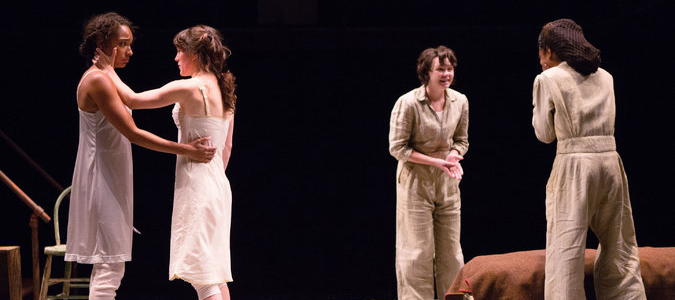

And I and Silence
Opening Night: August 25, 2014
Closing: September 14, 2014
Theater: Romulus Linney Courtyard Theatre at The Pershing Square Signature Center
Two imprisoned teenagers, one black, one white, form a perilous bond. As the young women serve time, they forge a plan for survival. When the outside world proves even more dangerous than the jail itself, their private world becomes an untenable practice ground for their new lives. And I and Silence explores the fierce dreams of youth and the brutal reality of adulthood in 1950’s America.
BUY TICKETSREAD THE REVIEWS:
August 25, 2014
Two teenage girls — one black, one white — meet while serving time in prison and immediately become one another’s kindred soulmate in Naomi Wallace’s intimate yet expansive And I And Silence, the first of three productions of the up-and-coming playwright’s works to be performed at the Signature Theatre Company this season. The expansiveness is derived from the depiction of the cruel world into which the girls are thrust, one that is rife with racism, poverty, and abuse. The intimacy stems from the deeply entwined relationship of friendship, love, and interdependence that develops between them as their only defense against such a world. The dual vision that the playwright brings to the table is both intellectually provocative and emotionally charged, like one of Picasso’s cubist paintings depicting a single subject from multiple perspectives at the same time. Yet whether the resulting whole makes for a fully satisfying theatrical experience is subject to its striking just the right balance between provocation and emotion.
READ THE REVIEWAugust 25, 2014
In And I And Silence, a challenging play by Naomi Wallace, two women, Dee and Jamie, one white, the other black, meet in prison when they are teenagers, and after they are released years later, struggle to survive together in a Southern town in 1959 – a struggle that ends in tragedy. That is a more or less accurate summary of the plot in this first of Naomi Wallace’s plays to be presented this season at the Signature. But it doesn’t really get at the play, which isn’t so straightforward. Wallace has two actresses portray each character. Scenes of the Young Dee (Emily Skeggs) and Young Jamie (Trae Harris) in prison alternate with scenes of the older Dee (Samantha Soule) and Jamie (Rachel Nicks) in the room that the two wind up sharing. Both scenes take place on the same spare set, on a kind of narrow catwalk that runs down the center of the Griffin Theater, splitting the audience in two. The abstract quality of the set reflects the language of the play. A respected theater artist who won a MacArthur “genius” fellowship, Wallace began as a poet, and her love of poetry strongly influences her approach to storytelling on the stage. The title of this play comes from a line from Emily Dickinson’s poem I felt a Funeral, in my Brain; some of the dialogue is in rhyming couplets. The playwright’s feel for language can be rewarding: “Soup for weeks now,” Dee complains to Jamie. “I hate soup.” “Well, I don’t think it likes you either, Dee, ’cause you always disrespect it. But after the rent it’s all we can afford.” But Wallace’s lyrical approach (the less tolerant would call it arty or vague) sometimes seems to work against the play’s apparent purpose. Originally commissioned by the London company Clean Break to perform in women’s prisons, And I And Silence seems meant to depict a “turbulent era” in American history, and expose what Wallace calls “one of the most oppressive economic systems in the world.”
READ THE REVIEWAugust 25, 2014
It’s easy to forget that not long ago living your life openly in America was an impossible dream, especially if you wanted to remain employed or, in some places, alive. That idea may have been on Naomi Wallace’s mind when she penned her taut, harrowing drama And I and Silence, playing at the Pershing Square Signature Center under Caitlin McLeod’s direction. With a strong cast and sensitively written script, this play examines a brutal period in American history that’s not as distant as we’d like to think. Wallace volleys the story’s action between two years. The play opens in 1959 in a small room furnished with a single bed and little more than a sink and a couple of wash basins. Dee (Samantha Soule), who is white, and Jamie (Rachel Nicks), who is black, have set up house in an unnamed American city. Work is hard to come by after spending several years in prison, where Dee and Jamie met and became friends. But both of them have dreams as big as the sky, even if those dreams include just getting jobs as house servants, earning some money, and meeting a couple of nice fellas, preferably brothers, so maybe they can all live together in one happy home. “Always loved it when you said maybe,” says Jamie. “Cause that always meant yes.”
READ THE REVIEWAugust 26, 2014
Women in prison: the new black? It’s mere coincidence, but with the Netflix series Orange Is the New Black having become one of the most talked-about television shows of the past few years, along comes And I and Silence, a play by Naomi Wallace about two young women incarcerated in the 1950s. Can “Caged: The Musical,” an all-singing, all-dancing update of that immortal B movie starring Eleanor Parker, be far behind? Fans of the Netflix show will probably not find much to satisfy them in Ms. Wallace’s play, which opened on Monday night at the Pershing Square Signature Center, kicking off the Signature Theater Company’s new season on a dirge-like note. The author of the well-regarded, much-produced black-plague drama One Flea Spare (from 1995) and several subsequent plays, Ms. Wallace does not write pulp. True, And I and Silence does contain a culminating spasm of violence, as well as a sexual encounter between its two characters, Dee and Jamie, who meet in the lockup when they are both still teenagers. (One is 17, the other about to turn the same age.) But it’s a long, dreary wait for any drama to emerge.
READ THE REVIEWAugust 25, 2014
Be so kind as to hand me the straight razor. And I And Silence, a new, politically potent historical drama from Naomi Wallace, deals with the casually racist and purposely cruel conditions for female prison inmates in the 1950s. It’s a strong piece of writing from this season’s playwright in residence at Signature, sensitively mounted and really well acted. But the unrelenting fatalism drives the lyrical expression, reducing the two characters to helpless victims, puppets dancing to a preordained destiny. Jamie (Trae Harris, an enchanting young performer in her Off Broadway debut) and Dee (Emily Skeggs, chalking up a good one for her resume) are teenagers when we meet them in Jamie’s cell in some unidentified prison in an undisclosed (but vaguely Southern) American city in 1950. Young Jamie is black and Young Dee is white, so it takes courage as well as ingenuity for the uneducated and dim-witted Dee to keep sneaking over from the “white wing” in her campaign to make friends with smart and feisty Jamie. Scribe Wallace, a MacArthur Fellow whose several prize-winning plays include One Flea Spare, writes tough plays, but in a lyrical tongue that hints of her native Kentucky. Although she has a showier rep in the UK than she has here, she gets a really fine production from the locals.
READ THE REVIEW






















